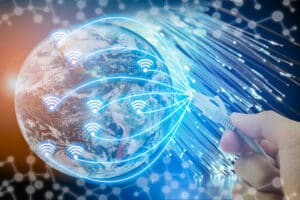From 17.05. until 19.05. this year's Google I/O took place. A constant in the Google cosmos that is eagerly awaited by developers and enough non-developers. The event is – who would have thought it – just about one thing: Google. The topics range from new software, such as Android O and the Google Assistant to smartwatches. Of course, the occasional fire in the associated kitchen should not be forgotten.
On the trail of artificial intelligence
Despite the many topics at the Google I/O, a clear red thread could be seen that bears the name Artifical Intellegence.
Google CEO Sundar Pichai's keynote left no doubt that a change from a "mobile first world" to an "AI first world" is an important step for the future of the company. If you look closely, there was actually hardly any innovation from Google that didn't take up the topic of artificial intelligence.
With the Google Lens app, for example, an old acquaintance returns. The app is strongly reminiscent of its somewhat neglected older brother, Google Goggles. In principle, the function remains the same: the app analyzes the photos taken and spits out as much information as it can. In the case of Google Lens, it's now much better.
Part of these and many other improvements to Google's services is artificial intelligence. Deep learning, Google for Jobs, machine learning, automatic replies for Gmail, second generation TPU chips - all keywords that actually only mean one thing: artificial intelligence.
TPU chips are Google-designed chips made specifically for machine learning. TPU stands for Tensor Processing Units. The TPUs accelerate "artificial" learning via algorithms and are used in the use or production of "artificial" neural networks. After the first generation of TPU chips appeared in 2016, the second generation has now been announced at Google I/O.
Below you can watch the mentioned keynote by Sundar Pichai:
A step back
Artificial intelligence is no longer a topic of tomorrow, the upheaval is already underway. The evidence for this is obvious. For example, has won an AI by the name of DeepStack in a game of poker the other day. Not through pure information advantage, but through learning processes. Aside from the poker face advantage, the AI also had to learn how to play poker round by round.
But AI is not only found in university experiments. The big term also creeps into everyday life. Sometimes without us being able to identify it as such. Disguised under application names and other terms. Here are a few examples:
- face recognition
- Chatbots
- Autonomous driving
- Speech and Text Recognition
- smart home
Is everything too unspectacular? This may well be due to the floating boundaries of the concept of AI. Even a clear definition of the meaning and scope of intelligence itself is controversial. Definitions are ambiguous and the AI seems like a mirage in the distance: no matter how long you walk towards it, the distance seems to stay the same. How come? We get used to technological advances. If you travel back in time, chatsbots would probably be called the super meltdown of artificial intelligence. Or as witchcraft, depending on how far back you travel. Today, however, one hardly immediately thinks of AI when it comes to a chatbot or text recognition.
The ability to learn seems to be decisive for our perception of computing processes as AI – at least for today’s idea. This is at least given to a certain extent in almost all of the systems mentioned above. Of course, the scope of the possible learning process varies depending on the algorithm. If this is too small, we are reluctant to classify it in the “intelligence” category.
The fact that the AI described above does not win against amateurs, but against poker professionals, makes one think of numerous sci-fi films. How long will scenarios like iRobot or Terminator be pure fiction? And should one even work towards researching artificial intelligence from these perspectives? After all, passionate and no less renowned scientists warn like Stephen Hawking and Elon Musk from the dangers of artificial intelligence.
Man's new best friend
The areas of application for AI in everyday life are huge - even unlimited. In a series of tweets, none other than Bill Gates advises young college grads to get a job in AI. The reason? The infinite possibilities of the much-controversial technology to move big things.
It is practically impossible to enumerate all areas of application of a distinctive artificial intelligence. Whether it's everyday tasks that an AI could do or exploring space with less risk, there's room for AI everywhere.
The greatest advantage of a "human machine" is probably the elimination of risk for humans, the physical resilience of machines and the lower susceptibility to errors. All the remaining benefits can be more or less derived from this: research opportunities in hitherto unknown areas such as the depths of the ocean, security eg in the form of crime fighting, improved medicine through lower error rates and better analyzes or ultimately just convenience in everyday life.
Philosophy around AI
Of course we are far from an AI on this scale. It is currently not possible for us to fully analyze and describe a person's perception with machines, let alone replicate perception in such machines. Accordingly, astronomical costs are unavoidable – at least at the beginning of a human-like AI. However, we do not want to address these and similar disadvantages here, but rather devote ourselves to the idea of a complete, widely implemented AI. iRobot, right?
As already described: The possible areas of application are endless. And this is exactly where the criticism of AI comes in with its biggest shock factor. The takeover of humanity by intelligent machines.
But what's often forgotten in the shadow of this menacing argument is the fact that AI, even without the "mutiny against its maker" drama, has some downsides. For example on the job market. More and more jobs are already being lost today. With a human-like AI, there would probably be no more jobs - except possibly in the AI area.
An advantage that quickly becomes a disadvantage is the lack of emotions. Even in situations that call for “common sense”, machines could have problems. But here, too, the fluid boundaries of the AI concept are shown again. Who says that at some point we won't be able to decode emotions and replicate them in machines? The deeper one gets into the discussion about an artificial human being, the more one drifts into the discussion about basic assumptions regarding humans. The question of human consciousness is crucial to the question of whether the horror scenario of humans vs. AI will ever materialize. The question of what nature this is and accordingly whether it can be copied, transmitted or artificially created in another vessel. But we will no longer address this question today.








